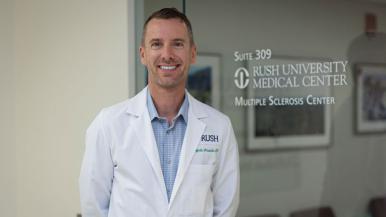Podcast transcript
Let's talk about the MS Center at Rush and the capabilities to diagnose and treat patients with MS. Can you expand on this a little bit?
The Multiple Sclerosis and Neuroimmunology Center at RUSH is the largest center in the Chicago area. We provide care to over 3,000 patients, and most of the patients have multiple sclerosis. But we also care for patients with other immunological disorders like neuromyelitis optica spectrum disorder, as well as MOG associated disease or MOGAD. At the center, it follows a comprehensive multidisciplinary approach to the care of our patients in which we believe that every aspect of the care is important, anywhere from having access to highly effective therapies, but also paying attention to lifestyle interventions, nutrition, exercise, diet … all of these factors that actually have a profound effect on clinical outcomes and quality of life.
I want to ask you specifically about neuromyelitis optica, which is a rare autoimmune demyelinating disorder that can present similarly to MS and can cause optic neuritis, transverse myelitis and area postrema syndrome. Since getting an accurate diagnosis is key, let's talk about RUSH's expertise in making a differential diagnosis for this condition.
This is very important because usually there is a lag between symptom onset and appropriate diagnosis in patients with NMOSD. And that delay could be as severe as 10 to 11 years. So often patients are misdiagnosed. Often patients start with symptoms that actually they end up seeing someone in ER and that results in misdiagnosis or delay of care. So it is critical to have specialized centers in which the providers have fellowship training or expertise in these rare disorders. NMOSD can present with similar symptoms to multiple sclerosis, but also can have some atypical presentations, for example, intractable or nausea or vomiting. And those are symptoms that perhaps may persuade physicians in the ER to refer patients to gastroenterology as opposed to a neurologist. A good neuroimmunological center is going to be able to provide that expertise even in the cases of atypical presentations.
Are there any other symptoms that patients with NMO have that could also lead to a misdiagnosis outside of the hiccups that you mentioned?
The most common presentation is optic neuritis, which is presenting usually with blurry vision. And that blurry vision can evolve very rapidly to complete loss of vision and it's usually painful. Patients often describe painful eye movements, in terms of NMOSD, that optic neuritis could present in both sides simultaneously. So it's a bilateral optic neuritis, which in multiple sclerosis is usually unilateral. It's usually one side or the other. The clinical presentation that NMOSD patients may have is what we call transverse myelitis, or lesions in the spinal cord, and often these lesions present with bilateral leg weakness or numbness or loss of sensation, but they also could have some atypical presentations like bladder or bowel symptoms like a frequency in urination or incontinence. And then there is a group of patients that can present with what we call brainstem lesions. And those lesions are in the brainstem, which is the lower part of the brain that connects to the spinal cord.
In that case, patients can present with hiccups with nausea, vomiting as we were describing, but also they can have other presentations like double vision, difficulty with balance. Sometimes the lesions can affect central parts of the brain. We call them the diencephalic structures like the thalamus. And in that case, patients can present with hypersomnolence or fatigue or periods in which they have an altered sleep cycle. They can present, for example, with a thermal dysregulation, difficulty keeping temperatures in the body. So those are some atypical presentations and we need to be educated on them and aware that if patients have these symptoms that might prompt, for example, doing more analysis with an MRI or some blood tests.
Would it be fair to say that part of making that differential diagnosis is the expertise of the physicians with the EMS center who are attuned to recognize those symptoms?
Absolutely. When you look at studies that evaluate the factors that lead to delaying care, the number one is having access to a specialized center.
On the therapy side, what treatments do you employ for NMOSD and how effective are they?
We currently have three FDA-approved medications for NMOSD, and those medications are very effective actually. We went from not having anything available to, all of a sudden, having three options that are highly effective. They cause selective suppression of certain immune cells that are known to play a role in the pathology of the disease. So those immune suppressants have a different mechanism of actions, they have different frequencies. We have options that are subcutaneous. We have options that are intravenous and the frequencies range anywhere from one treatment every six months to one infusion every two weeks. We meet with patients, explain these options and try to personalize the care to many factors including how the disease presents, but also the patient’s preference in lifestyle. Some patients might prefer not to have infusions every two weeks and they say, "Well, no, I travel a lot to work." So perhaps an infusion every six months is more appropriate.
The earlier a patient is diagnosed with NMOSD, the better, obviously. But for patients who are delayed later, does the effectiveness of those infusion therapies lessen after that delayed diagnosis or is the effectiveness of those treatments the same?
The efficacy of the medication remains the same. However, we know that the number one strategy that we have to help our patients with NMOSD is to prevent relapses, to prevent lesions. We know that most of the accumulation of disability that our patients suffer comes from an incomplete recovery from a relapse. Those relapses can lead to devastating consequences, sometimes complete blindness of difficulty ambulating or having to use a wheelchair. So all we can do is to prevent relapses. So it's critical that we establish a diagnosis as soon as possible after the onset of symptoms, and we start appropriate therapies as soon as we can so we can prevent any subsequent relapses.
And do we have data on the effectiveness of those therapies for NMOSD?
All three medications have been approved by the FDA, and that approval came as a consequence of reviewing phase-three clinical trial data that the medications were tested in humans with seropositive NMOSD, and it was established efficacy that was superior to placebo.
Overall brain health and wellness is key to helping those patients enjoy a good quality of life and also to help them extend that quality of life for many years. Can you elaborate on why that's so important for that commitment to overall brain health?
There is an interest in brain health overall in the neurological community, but it's my personal interest. It's been the focus of my career for the last 10 years in trying to understand how we can not only prevent disease from happening, but most importantly how we can enhance and promote the optimal function of the brain. And that is all these activities that we were discussing before, anywhere from lifestyle interventions, the use of exercise, healthy nutrition, sleep, treatment of comorbidities — for example, hypertension or diabetes or obesity — all of those factors we know that play a role in the optimal function of the brain. So brain health, in a sense, is a term that is being used to describe all the activities, whether it is lifestyle activities or healthcare-related activities that will influence the optimal function of the brain.
It seems like those things that you talked about are just good common-sense ways for a person to take care of themselves in general. Is this approach novel? Has there been a renewed focus on focusing on overall brain health and wellness recently, and what are the reasons why?
The reason why is because now finally we start to have evidence-based information that allow us to not only recommend these strategies, but also be able to personalize that to an individual, right? So most of the things we do in medicine are supported by the evidence. So moving on from what you described using common sense to now being able to say, well, we have studies that showed if you exercise 150 minutes a week, and if that exercise is diverse with a combination of aerobic exercise plus weight training, if you have multiple sclerosis, you're going to have benefits in X, Y or Z.
So now there is a body of evidence that has been published in the last decade that is allowing us to have data that support the recommendations of the use of these interventions. The same is true with nutritional strategies. It is extremely difficult to do studies when you evaluate nutrition because as you can imagine, it's hard to enroll patients that will eat the same type of approach for a long period of time without any variations. So these studies actually took a long time to build a body of evidence that will allow us to truly have some degree of research data that can allow us to make these recommendations. Now that's happening. We are slowly starting to see publications giving us this support to the recommendations of lifestyle interventions.
Do you think we could do a little bit of a detour and look at maybe some of the data that's particularly interesting to you around some of those lifestyle changes that patients could make?
Basically, what we know is that in terms of, for example, exercise, let's talk about multiple sclerosis. There are many studies that actually showed a benefit not only in improving muscle strength, but also improving walking performance, improving balance, decreased fatigue, decreased depression. Also, the use of exercise has been linked to improve health-related quality of life when you go more into how exercise can benefit the disease itself. In multiple sclerosis patients, we often look at things like relapse rate, how many clinical events patients have, how many lesions patients accumulate over time.
When exercise is used as a planned structural intervention — not just simply saying, "Well, I'm going to walk the dog one day and then I'm going to do nothing the next day" — but having a routine of exercise that is planned, structured and repetitive, patients with multiple sclerosis were found to have less likelihood of relapses, have decreased likelihood of new lesions.
But perhaps the most impressive part is that they have decreased chances of brain volume loss, something that we call atrophy. These outcomes are not that different from the outcomes we started to see in some of the pharmacological interventions. The fascinating part is that if you can truly get to the point in which we can offer our patients a combination of strategies. On one hand, try to decrease inflammation with the use of highly effective therapies. That's important. But on the other hand, what can we do to enhance those benefits through lifestyle interventions that are actually targeted to any patient's need that are actually methodically structured. We should be using exercise as another way of medical intervention.
What about on the nutrition side of things?
In terms of multiple sclerosis, we know there is a connection between the gut and the brain, and that applies to many areas in medicine. But in MS, that gut-brain connection has been studied with quite a lot of interest in the last decade. And we know that the gut microbiome — those bacteria that we have in the gut that helps regulate so many things — has a key role in regulating immune responses and inflammatory responses. What we eat is going to have a profound effect on that microbiome, and also things like smoking are going to cause more inflammation. So the diet that has the strongest evidence to be beneficial in multiple sclerosis. There is this Mediterranean diet that is high in leafy greens and vegetables as well as high in fruit, and also includes things like grains, for example, to decrease the content of trans fats or animal-based trans fats. So those are the recommendations that we are starting to see that play a role in multiple sclerosis.
I know one of your passions as a provider is to provide access to care for underserved populations. Can you elaborate on what specific aspects of care fall through the cracks for underserved groups, as well as identifying what groups you're trying to target?
The optimal care in multiple sclerosis — and I will argue in medicine in general — but in MS that applies is what we call personalized care. We know that one model does not fit all patients. Every patient is unique, and the factors that determine personalized care are race, ethnicity and also the social determinants of health, whether it is socio-economic status or access to housing, for example. All of those factors will play a role in the overall outcomes. So it's been a passion of mine to try to not only understand that in terms of the clinical side, but also be able to provide support services that will allow patients from marginalized groups, or patients with difficulty with access to healthcare to have at least some way to get access to things like education and access to resources.
It's important to be cognizant of those differences. When it comes to the disease itself, we know that race plays a role in not only in increasing or decreasing the risk of multiple sclerosis, but also when someone has multiple sclerosis, different races, for example, are linked to different outcomes. We've known that, for example, Blacks tend to have worse clinical outcomes, and that's independent of any type of access differences to healthcare. The same is true with Hispanics. They have a more prevalence of certain manifestations like spinal cord disease, which naturally will lead to higher rates of disability.
Armed with this knowledge, what are some of the specific things that you and RUSH are trying to do to address those issues?
One of the things that was very attractive for me to come to RUSH was the fact that Rush University has established a tradition of patient-centered care. And I believe that it has the resources that are going to be very beneficial and helpful for us to truly build that comprehensive, multidisciplinary approach in which we understand that every patient is unique and we are paying attention to not only the physical exam and the MRI, but to things like ethnicity, race, social issues, social determinants of health and comorbidities.
We'll look at diet, nutrition and interventional strategies that go beyond medication and be able to take one patient at a time and provide that unique personalized care. We are starting a program called the Brain Health Program at RUSH, and that's going to include three components. One is the Brain Health Clinic, where patients will have access to a one-on-one consultation with a brain health expert, and that person is going to take an intake questionnaire to understand the patient's needs and develop a personalized plan, whether it's through exercise intervention or nutritional intervention, but also sleep and medication management to address those issues.
The program also includes a second component, which is a brain health educational program, and that is going to be a series of educational offerings anywhere from webinars to monthly meetings to three-week brain health programs for patients to enroll in. And there is absolutely no additional cost to any of these things. The third component is a brain health research program in which patients have the option to enroll and have personalized data that is shared with patients in real time, but also longitudinally. We can follow and track how these interventions are affecting individualized outcomes.
With regards to the social determinants of health, what would you say is the first key step in helping providers better address patients' needs in this area?
I think awareness is the first step in addressing a problem. So understanding the problem, that these social determinants are real and present, being able to provide comprehensive care to any and every one regardless of their social status, income or access to healthcare or health insurance. I think those are concrete examples of that. Also, having providers that are educated and aware of the fact that race plays a critical role in healthcare outcomes. And you'll be surprised nowadays that there are centers in which providers will argue that race is a social construct and by such, it has no influence in clinical outcomes. So being mindful of that is the first step in making a difference. As an example, we offer a fellowship training program here, and our fellowship director has an interest in his career, Dr. Sierra-Morales, on diversity, equity and inclusion. Part of the fellowship training includes research and education on diversity, equity and inclusion, and social determinants of health.
This is a good segue to my last series of questions for you around medical education, which is another passion of yours. Despite the overwhelming amount of information that's available online about MS or MS care, misinformation can be spread pretty easily. What are some of the issues that you've encountered with patients who are coming to you who are misinformed?
As you know, data is available. There is a difference between data and information. Information is an active process of looking at the data and determining, is this evidence-based, is it opinion-based, or this is just flat-out misinformation? Information itself doesn't constitute knowledge. Knowledge is when we are able to identify these individual pieces of information and link them together into a story. And then knowledge itself doesn't equate to healthcare literacy. So, healthcare literacy is the next step, in which you're able to look at the knowledge and say, "Okay, let's apply that to a goal."
Helping our patients improve their healthcare literacy has been my focus of the last 10 years in medical education. Being able to say, “Well, can we improve healthcare outcomes by the way we provide education to our patients? Can we improve healthcare literacy?” The number one challenge is time. It's extremely difficult to accomplish that in the outpatient visit, and that's the wrong context. Patients, when they come to the clinic, have a list of their complaints, the things they want to ask, and perhaps they're not ready to be educated. So we have to take medical education outside of the clinic, and that's why we are offering, as part of this brain health program, a series of educational offerings where the number one goal is to improve healthcare literacy.
Are there any metrics that you use to evaluate how successful those outreach efforts are?
We have those metrics and we've been polishing those. We do a baseline assessment and then we do an assessment after the educational intervention to assess things like confidence in discussing, for example, the use of disease-modifying therapies with my provider and understanding of the difference between MS worsening and deconditioning, but also things like understanding what is brain reserve and what are the factors that influence brain health. We have all this information and we had an overwhelming improvement in patients when they complete these educational offerings before and after in terms of their overall healthcare literacy.
It seems to me that better informed patients also tie in with overall brain health and wellness that we spoke about earlier. Have you noticed that patients being more informed about how their disease can progress and troublesome signs to watch out for has that led to better quality-of-life outcomes for those patients?
Yes. It’s not only my opinion, actually, as a matter of fact, but it’s one of the priorities for the overall neurology community to improve healthcare literacy because it's been demonstrated that patients who have higher level of literacy do better in medicine. So they have better clinical outcomes, they have better understanding of the importance of these type of lifestyle interventions. To be honest, it is one thing is for doctors to tell patients you need to eat healthy. That may or may not translate into patients changing their diet, which is extremely difficult. So, we need to move on from doctors telling patients to more of a shared decision-making in which this is a process which takes time. But ultimately the goal will be that, through education, we can actually help patients make those meaningful changes in their lives that are known to have benefits in the overall clinical outcomes in the future.
Is this proactive approach, to get out in front of the community to provide this medical education, a commonplace type of phenomenon that exists in hospitals overall, or is this something that's more unique? I know you were ahead of the game, so to speak for a long time, and this being a priority for you as a clinician.
It's not new, if you know what the meaning of doctor is — the root of the word means to teach. So doctors were known to be individuals in society that the number one function, even prior to having medications, was to teach, to educate. So this is not new. However, we have been, as a community, distracted in the last 100 years in looking at medications or pharmacological interventions as the main function by which we exist. But the truth is that we should continue with that. I think the pharmacological development have led to significant improvements and benefits in overall health, but we shouldn't forget the fact that education and patient education being in the community has also equally profound benefits.




